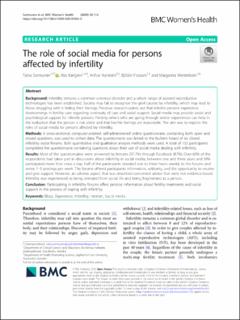| dc.contributor.author | Sormunen, Taina | |
| dc.contributor.author | Karlgren, Klas | |
| dc.contributor.author | Aanesen, Arthur | |
| dc.contributor.author | Fossum, Bjöörn | |
| dc.contributor.author | Westerbotn, Margareta | |
| dc.coverage.spatial | Sweden | en_US |
| dc.date.accessioned | 2020-12-10T14:32:41Z | |
| dc.date.available | 2020-12-10T14:32:41Z | |
| dc.date.created | 2020-08-28T17:42:30Z | |
| dc.date.issued | 2020 | |
| dc.identifier.citation | Sormunen, T., Karlgren, K., Aanesen, A., Fossum, B., & Westerbotn, M. (2020). The role of social media for persons affected by infertility. BMC Women’s Health, 20(1) | en_US |
| dc.identifier.issn | 1472-6874 | |
| dc.identifier.uri | https://hdl.handle.net/11250/2716987 | |
| dc.description.abstract | Background
Infertility remains a common universal disorder and a whole range of assisted reproductive technologies has been established. Society may fail to recognize the grief caused by infertility, which may lead to those struggling with it hiding their feelings. Previous research points out that infertile persons experience shortcomings in fertility care regarding continuity of care and social support. Social media may provide social and psychological support for infertile persons. Finding others who are going through similar experiences can help in the realization that the person is not alone and that her/his feelings are reasonable. The aim was to explore the roles of social media for persons affected by infertility.
Methods
A cross-sectional, computer-assisted, self-administered online questionnaire, containing both open and closed questions, was used to collect data. The questionnaire was linked to the bulletin board of six closed infertility social forums. Both quantitative and qualitative analysis methods were used. A total of 132 participants completed the questionnaire containing questions about their use of social media dealing with infertility.
Results
Most of the questionnaires were answered by females (97.7%) through Facebook (87%). Over 60% of the respondents had taken part in discussions about infertility in social media, between one and three years and 39% participated more than once a day. Half of the participants devoted one to three hours weekly to the forums and wrote 1–5 postings per week. The forums offered participants information, solidarity, and the opportunity to receive and give support. However, an adverse aspect that was described concerned advice that were not evidence-based. Infertility was experienced as being alienated from social life and being fragmented as a person.
Conclusion
Participating in infertility forums offers persons information about fertility treatments and social support in the process of coping with infertility. | en_US |
| dc.language.iso | eng | en_US |
| dc.publisher | BioMed Central | en_US |
| dc.rights | Navngivelse 4.0 Internasjonal | * |
| dc.rights.uri | http://creativecommons.org/licenses/by/4.0/deed.no | * |
| dc.subject | blogs | en_US |
| dc.subject | experience | en_US |
| dc.subject | infertility | en_US |
| dc.subject | internet | en_US |
| dc.subject | social media | en_US |
| dc.title | The role of social media for persons affected by infertility | en_US |
| dc.type | Peer reviewed | en_US |
| dc.type | Journal article | en_US |
| dc.description.version | publishedVersion | en_US |
| dc.rights.holder | © The Author(s) 2020 | en_US |
| dc.source.pagenumber | 1-8 | en_US |
| dc.source.volume | 20 | en_US |
| dc.source.journal | BMC Women's Health | en_US |
| dc.identifier.doi | 10.1186/s12905-020-00964-0 | |
| dc.identifier.cristin | 1825855 | |
| dc.source.articlenumber | 112 | en_US |
| cristin.ispublished | true | |
| cristin.fulltext | original | |
| cristin.qualitycode | 1 | |

